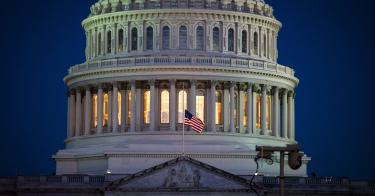It may seem like Americans can’t agree on anything, but one thing comes close: Approval ratings for federal institutions such as Congress and executive branch agencies. They’ve declined significantly in recent years and sit today near an all-time low.
Bottom line: The public thinks Washington is doing a bad job, and it’s not wrong.
Why is there so much dissatisfaction? Two recent pieces of information shed some light.
On July 25, the Congressional Budget Office released a report revealing that at least 1,264 federal programs and bureaus have expired authorizations, and that they received a whopping $516 billion in appropriated funding for fiscal 2024.
On July 26, the Treasury Department announced that the gross national debt reached $35 trillion. This ocean of red ink—more than $267,000 for every household in the country—has increased a staggering $11.5 trillion since the COVID-19 pandemic started in 2020.
Both are daunting challenges. Fortunately, it’s possible to address them at the same time if representatives are willing to put the nation’s needs ahead of special interests.
When it comes to spending on federal activities whose legal authorization has expired, the problem is not new. There are 64 expirations from the 1990s, and 22 from back in the 1980s. And the backlog is growing.
Conservatives might be tempted to think that long-expired programs should be treated like long-expired milk and discarded. But this is not always the case:
Groups of core foreign affairs programs expired in 1987 and 2003.
Much of the Department of Justice, including the federal prison system and FBI, expired in 2009. Assistance to state governments in dealing with criminal aliens expired in 2011.
A significant authorization of medical funding for veterans expired in 1998.
The problem of expired spending authorizations is as much about neglect as it is about waste.
Ideally, Congress should perform regular oversight activities and produce legislation to reform or wind down underperforming parts of the federal behemoth.
Because there has been such a buildup of agencies and programs over the last century, however, staying on top of the sprawling mess seems impossible for many in Congress.
Besides, it would leave much less time for members to make fundraising calls.
A similar dynamic is at play with the federal budget.
While balanced budgets, sadly, have been few and far between in recent decades, Congress had historically worked to reduce the deficits during times of peace and strong economic growth. It was not uncommon in the late 20th century for bipartisan coalitions to pass legislation to cut waste and streamline programs.
That seems like ancient history.
Rather than occasionally putting Uncle Sam on a diet to avoid economically damaging levels of debt, members of both parties are more concerned about avoiding fights with entrenched special interests that benefit from current funding streams and subsidies.
Since many Americans have never heard of Medicaid provider taxes, the Davis-Bacon Act or the federal maple syrup program, they are unlikely to call their representatives to complain about wasted tax dollars.
Any effort to reform or eliminate these and similar perks, however, would be met with a lobbying campaign to keep the gravy train rolling, which means there would be political costs. It’s easier to turn a blind eye to an increasingly unaffordable government.
The result is predictable. The combination of minimal oversight and little concern about excessive deficit spending from Congress is a recipe for wasted tax dollars, dysfunctional and unaccountable bureaucracies and a corrupt system that increasingly benefits the politically connected at the expense of the broader public.
Addressing these problems will require a combination of effort from legislators and consistent pressure from constituents who are fed up with the increasingly broken status quo.
The tea party movement is a good example of the latter. It was a bottom-up push that led to some overdue belt-tightening in Washington. That grassroots sentiment has faded, however.
While the American experiment has survived for 248 years and produced the most prosperous nation in history, it is vital for its citizens not to become complacent. A healthy democracy requires healthy institutions and public vigilance.
In 2024, both are in short supply, and our country is paying the price.
This piece originally appeared in Washington Examiner



